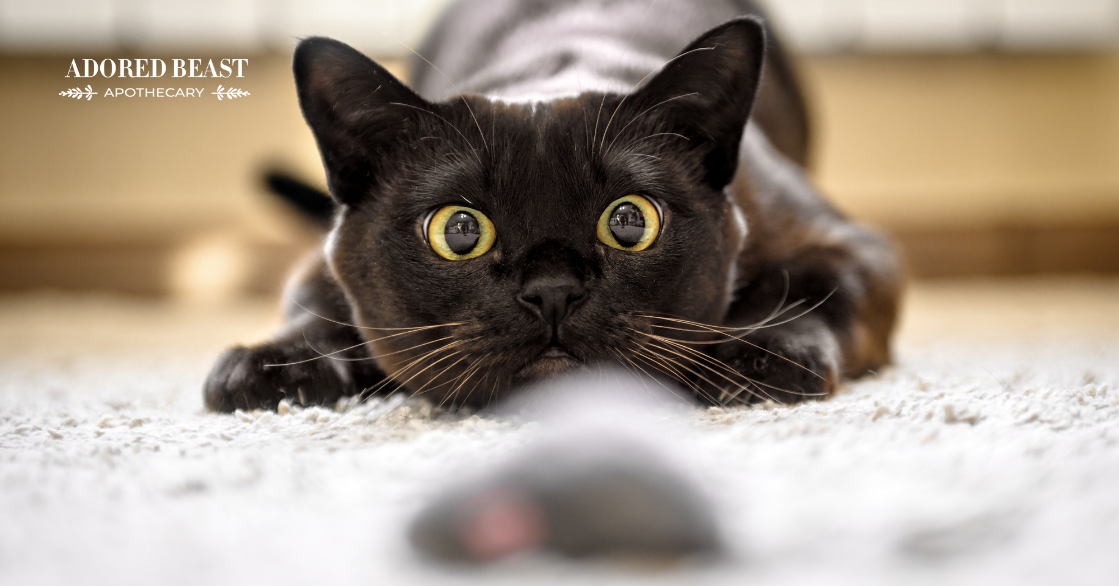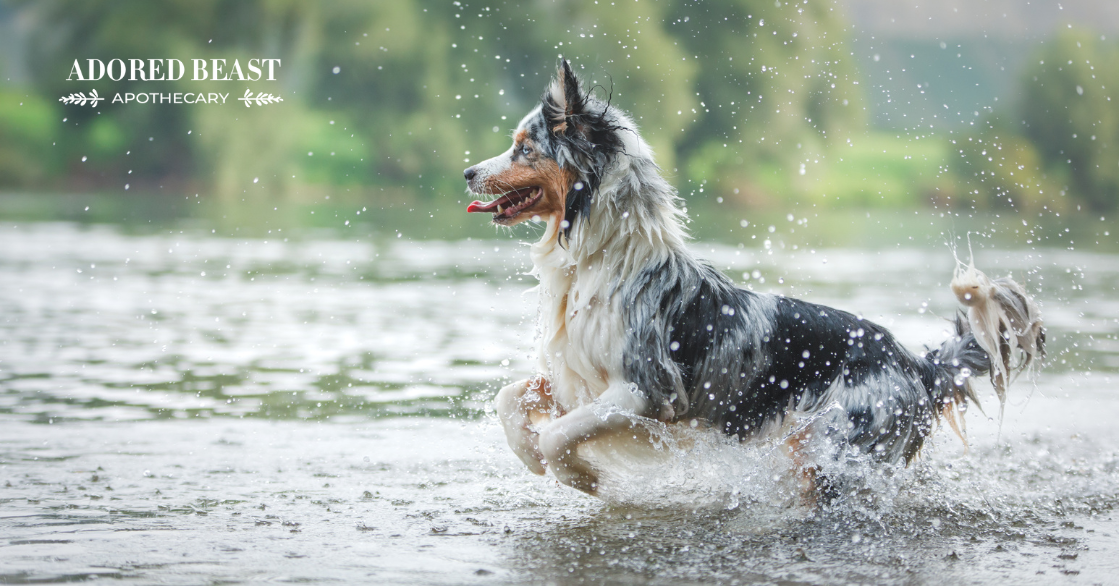A few months ago, we wrote about the benefits of slippery elm for digestive upset in dogs. And we quickly realized we’d done our furry felines a disservice. We had many pet parents coming to us wondering about using this herb for their cats as well as their canines.
And our answer is a resounding “yes!”
Slippery elm for cats is a versatile, effective herb with many different uses. It is very safe and nontoxic, and easy to use.
Slippery Elm for Cats
There are many wonderful healing properties to Slippery Elm:
- demulcent – soothing, mucilage-forming
- emollient – soothing and protective for skin
- nutritive – provides nutrients to the body
- tonic – promotes and supports healthy function of one or more body systems
- astringent – constricting, binding or drying effect
Slippery elm for cats (and dogs and humans as well) can be used both internally and externally, which of course increases its value.
Here are our favourite uses of slippery elm for cats:
1. Digestive Upset/GI Inflammation
Your cat’s digestive tract can become inflamed for a variety or reasons – something they ate, bacteria, a food sensitivity, medications, or a chronic issue like leaky gut or inflammatory bowel disease. And when this happens, you’ll often see a variety of symptoms, perhaps the most common of which are vomiting and diarrhea.
Herbalists have long celebrated the virtues of slippery elm as a digestive helper. This is largely thanks to its ability to act as a demulcent. Demulcent plants contain a polysaccharide molecular complex called mucilage. When this mucilage comes in contact with water, it turns into a slimy, gel-like substance. And this gel is magical…
Think about when you apply aloe vera to a sunburn. Right away you get that soothing relief, and you can feel that protective layer forming on your skin. You can almost hear your body saying “ahhh, thank you.”
That’s how your cat feels when you give them slippery elm.
And the proof is in the pudding. Or in this case, the science. A 2013 study on the management of canine and feline vomiting and diarrhea tested the efficacy of slippery elm in a veterinary setting. The results were pretty incredible: 77% of cats with vomiting and 79% with diarrhea responded to slippery elm within 2 days or 4 doses.
2. Hairballs
All cat owners know that hairballs are a regular part of living with a cat. And while they’re somewhat normal, you can help to lessen their severity or frequency.
Hairballs are typically caused by over-grooming – there’s just too much fur in the digestive tract and your cat needs to get it out! Cats don’t really break down fur the same way they do food. So any fur they ingest, usually via regular grooming, has to come out somehow. Then your cat needs to “force” that goopy mass out – usually by vomiting.
Over-grooming can be a symptom of:
- allergies
- fleas
- stress
- boredom
- hormone imbalances
- medications
- excessive bathing
- pain
When it comes to hairballs, slippery elm helps lubricate the digestive tract and lubricate along the mucus membrane lining. It’s also high in natural fibre, and most cats suffering from recurring hairball issues tend to be deficient in fibre. (Fibre can also help with chronic constipation and/or diarrhea!).
3. Urinary Tract/Bladder Infections
We mentioned that slippery elm soothes, and that soothing extends to the bladder lining and urinary tracts. It coats the urinary tract, thus helping to soothe painful urination, and provides support to inflamed tissues.
[READ NEXT] Bladder Infections in Dogs and Cats – Easy-to-Understand Tools
4. Inflammation
Slippery elm is said to relieve inflammation of virtually any mucus membrane, and has been used in the treatment of inflammatory conditions of the:
- lungs (asthma)
- kidneys
- throat
- joints (arthritis)
5. Skin Issues
Externally, you can use slippery elm to soothe and help with the process of healing many types of skin issues. Hot spots, rashes, bug bites, etc., can all benefit from a soothing paste of slippery elm powder mixed with a little bit of water. Because of its mucilage-forming properties, it creates a natural bandage that you can leave on for several hours – just try to keep your kitty from licking it off – it won’t work if they do. You can remove it later by gently wiping it with water or a mild, dilute chamomile tea.
How to Give Your Cat Slippery Elm
As mentioned, you can uses slippery elm both internally and externally.
Externally (just in care you missed it), use it by mixing a little slippery elm powder with some water and apply it to the effected area. Leave it on for several hours (as long as your cat is not constantly trying to lick it off). You can then remove it by wiping it gently with a damp cloth.
Internally, there are several ways to use it.
1. Feline Gut Soothe
Our Feline Gut Soothe is especially useful if digestive upset or hairballs are your main reason for using slippery elm for cats. It combines various herbs with pre and probiotics to help soothe the digestive tract and help enhance the immune response of the digestive tract.
Remember, slippery elm targets many different areas of the body aside from the gut! It was developed by Julie in her clinic to really deal with so many of our adored felines’ different issues. Yes, it has a focus on things like leaky gut, vomiting and diarrhea, and IBD, but it is equally focussed on prevention and support for lung health (asthma) and bladder health (interstitial cystitis) – all the uncomfortable conditions our beautiful kitties may have to deal with!
2. Single Supplement
You can buy slippery elm as a single supplement and follow the directions. Be careful of the ratio. If it’s just a basic 1:1 powder, dosage guidelines go by weight, and recommendations are 100 milligrams per 10 pounds of weight, two to four times daily. If you have powdered extracts, that ratio may be much higher, so just be wary and be aware of the strength of your herb. You can add it mixed into your cat’s regular food, or blend it into a little bit of water or gentle bone broth.
Slippery elm is inexpensive and easy to use, with a good safety profile. Because it can be used for such a wide variety of issues, it is always ideal to keep some on hand for when something springs up. Whether your cat is just battling a little tummy trouble, or tends to struggle with reoccurring hairballs, slippery elm may just be exactly what’s needed. Again, we turn to Mother Nature for the answers 🙂












